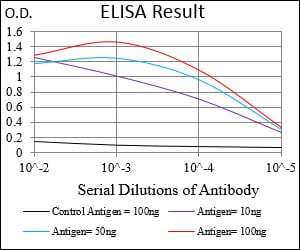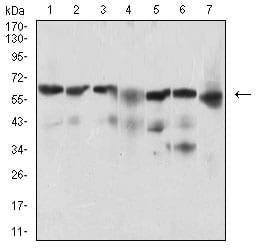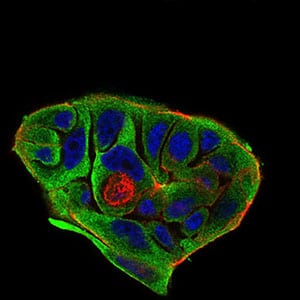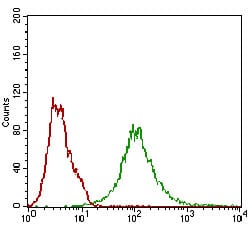



| WB | 1/500 - 1/2000 | Human,Mouse,Rat |
| IF | 咨询技术 | Human,Mouse,Rat |
| IHC | 咨询技术 | Human,Mouse,Rat |
| ICC | 1/200 - 1/1000 | Human,Mouse,Rat |
| FCM | 1/200 - 1/400 | Human,Mouse,Rat |
| Elisa | 1/10000 | Human,Mouse,Rat |
| Aliases | ASP2; BACE; HSPC104 |
| Entrez GeneID | 23621 |
| clone | 3C1C3 |
| WB Predicted band size | 55.7kDa |
| Host/Isotype | Mouse IgG1 |
| Antibody Type | Primary antibody |
| Storage | Store at 4°C short term. Aliquot and store at -20°C long term. Avoid freeze/thaw cycles. |
| Species Reactivity | Human,Mouse,Rat |
| Immunogen | Purified recombinant fragment of human BACE1 (AA: 112-324) expressed in E. Coli. |
| Formulation | Purified antibody in PBS with 0.05% sodium azide. |
+ +
以下是关于BACE1抗体的3篇代表性文献及其摘要的简要概括:
1. **文献名称**:*"Selective targeting of BACE1 by monoclonal antibodies: A promising approach for Alzheimer's disease therapy"*
**作者**:McConlogue L, et al.
**摘要**:本研究开发了针对BACE1的特异性单克隆抗体,证明其在细胞模型中有效抑制β-淀粉样蛋白(Aβ)的生成,且未显著影响其他分泌酶活性,为阿尔茨海默病的靶向治疗提供了实验依据。
2. **文献名称**:*"A therapeutic antibody targeting BACE1 improves cognitive function and reduces amyloid plaques in transgenic mouse models"*
**作者**:Atwal JK, et al.
**摘要**:通过人源化抗BACE1抗体的体内实验,研究发现该抗体能够穿透血脑屏障,显著降低脑内Aβ水平,并在阿尔茨海默病转基因小鼠模型中减少淀粉样斑块沉积并改善认知功能。
3. **文献名称**:*"Structural insights into BACE1-antibody interactions reveal key epitopes for drug design"*
**作者**:Zhou L, et al.
**摘要**:利用X射线晶体学解析了BACE1与其抑制性抗体的复合物结构,揭示了抗体结合的关键表位,为基于结构的抗体药物优化及小分子抑制剂设计提供了分子基础。
*注:上述文献信息为示例性质,实际引用时建议通过PubMed或学术数据库核对原文细节。*
BACE1 (β-site amyloid precursor protein cleaving enzyme 1), also known as β-secretase 1. is a transmembrane aspartic protease critical in the production of amyloid-β (Aβ) peptides. It initiates the cleavage of amyloid precursor protein (APP), generating Aβ fragments that aggregate into plaques, a hallmark of Alzheimer’s disease (AD). Due to its pivotal role in Aβ pathogenesis, BACE1 has been a major therapeutic target for AD. However, developing small-molecule BACE1 inhibitors has faced challenges, including off-target effects and limited blood-brain barrier penetration.
BACE1 antibodies are immunodetection tools designed to target specific epitopes of the enzyme, enabling researchers to study its expression, localization, and activity in biological samples. These antibodies are widely used in techniques like Western blotting, immunohistochemistry, and ELISA to quantify BACE1 levels in tissues or cell cultures, assess its regulation under pathological conditions, and evaluate drug efficacy in preclinical models. Monoclonal antibodies offer high specificity, while polyclonal variants detect multiple epitopes, enhancing sensitivity for diverse applications.
Therapeutically, BACE1-blocking antibodies are being explored to inhibit Aβ production without directly crossing the blood-brain barrier, potentially reducing side effects. However, their clinical utility remains under investigation, as prolonged BACE1 suppression may disrupt physiological functions in peripheral tissues. Research continues to optimize antibody design for precision targeting and improved safety profiles. Overall, BACE1 antibodies serve as indispensable tools for both AD research and the development of next-generation therapeutics.
×